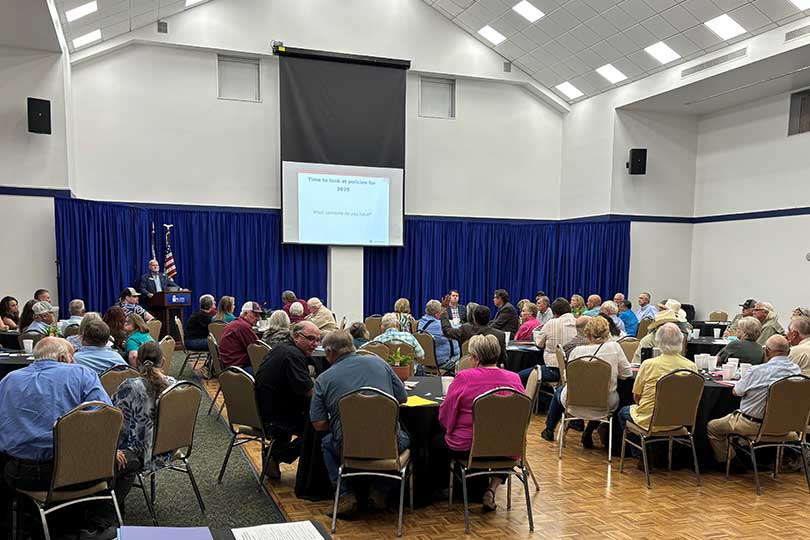By Julie Tomascik
Editor
Foreign ownership of land, solar facility tax subsidies and the current agricultural economy were among the topics discussed at Texas Farm Bureau (TFB) policy development meetings across the state this fall.
Policy development meetings are part of the process to create the organization’s road map for the upcoming year, allowing members to surface and discuss potential policy changes.
“Our strength as a grassroots organization lies in our members, whose voices shape the policies that steer Farm Bureau,” said Brant Wilbourn, TFB associate director of Commodity and Regulatory Activities. “These policy development meetings are crucial for setting our direction on both the state and national levels. While each region has its unique challenges, the issues discussed resonate across all of agriculture and rural life in our state.”
About 620 county leaders representing nearly 150 counties attended the district meetings.
Landowners discussed foreign ownership of agricultural land and ways to make Farm Bureau policy more robust as it relates to national security while still balancing private property rights.
The agricultural economy and the need to pass a modernized farm bill were also among the topics discussed.
Market prices continue to steadily decline, with current price projections below the average cost of production for some crops.
“The outlook for the agricultural economy is grim. Commodity prices have declined while input prices remain elevated,” Wilbourn said. “These conditions coupled with higher interest rates are causing alarm, especially since the farm bill, which has been extended once, expires this month. Members are concerned about their operations surviving until any assistance provided by the safety net comes once the farm bill is enacted and may need assistance before that happens.”
Solar panels are cropping up across rural areas of the state, fueling concern about the loss of productive farmland.
“Large tracts of prime farmland are being taken out of production and having solar facilities installed on them,” Wilbourn said. “Discussion centered around federal tax subsidies incentivizing this and that there should be guardrails in place to ensure we don’t lose any more farmland.”
One form of carbon capture involves injecting carbon dioxide underground. Members discussed concerns with liability and regulatory oversight of these projects.
Additional policy issues discussed at the meetings included improvements to the livestock brand identification system and creating an exemption for on-farm slaughter and direct-to-consumer sales.
County Farm Bureaus must submit policy resolutions that were adopted at their annual meeting to the state office by Oct. 25.
State and national policy proposals approved by county Farm Bureaus will be considered by the TFB Resolutions Committee in November.
The committee’s recommendations will then be forwarded to the TFB Annual Meeting in December for consideration by the voting delegates.


Leave A Comment